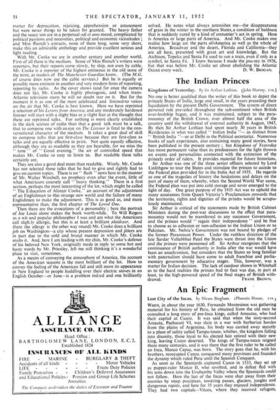The Indian Princes
Kingdoms of Yesterday. By Sir Arthur Lothian. (John Murray. 2 s.) No one is better qualified than the writer of this book to depict the princely States of India, large and small, in the years preceding their liquidation by the present Delhi Government. The system of direct personal rule prevailed throughout the sub-continent when British over-lordship began, and it was maintained, subject to the para- mountcy of the British Crown, over almost half the area of the country until the withdrawal of external authority in August, 1947. By then Sir Arthur Lothian had spent nearly 30 years in British Residencies in what was called " Indian India 7— as distinct from "British India "—or at Delhi in the Political secretariat. Numerous books of such experiences, also containing many good stories, have been published in the present century ;_ but Kingdoms of Yesterday has more permanent value than its predecessors for the light thrown on events and personalities connected with the extinction of the princely order of rulers. It provides material for future historians.
Sir Arthur was one of the three senior officers selected by Lord Linlithgow to tour the States and stimulate the princes to accede to the Federal plan provided for in the India Act of 1935. He regards as one of the tragedies of history the hesitations and delays on the part of many of them, whereby, when the Second World War came, the Federal plan was put into cold storage and never emerged to the light of day. One great purpose of the 1935 Act was to uphold the many assurances from Queen Victoria's Proclamation onwards that the territories, rights and dignities of the princes would be scrupu- lously maintained.
Sir Arthur is critical of the statements made by British Cabinet Ministers during the post-war discussions to the effect that para- mountcy would not be transferred to any successor Government, and the princes would "regain their independence" and be free to choose as to adhesion or non-adhesion to the Indian Union or to Pakistan. Mr. Nehru's Government was not bound by pledges of the former Paramount Power. Under the ruthless direction of the late Sardar Vallabbhai Patel the States were thrust into the Union and the princes were pensioned off. Sir Arthur recognises that the continuance of British authority in India after the war would have been an anachronism, but considers that the States so long familiar with paternalism should have come to adult franchise and parlia- mentary government by educative stages. This, however, was a matter for Indian decision. The lack of candour shown in Whitehall as to the hard realities the princes had to face was due, in part at least, to the high-powered speed of the final stages of British with-


































 Previous page
Previous page